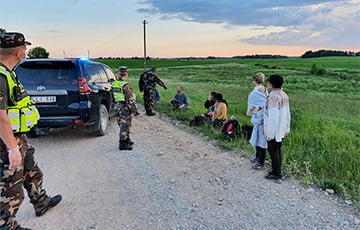Lithuanian Border Guards: The Flow of Illegal Migrants from Belarus Has Already Exceeded the Figure for the Entire 2020 by Five Times
9- 15.06.2021, 12:28
- 5,304

Most of them are citizens of Iran, Iraq, Turkey, and Yemen.
Since the beginning of 2021, Lithuanian border guards have already detained 387 foreigners who tried to illegally arrive from Belarus. This figure is almost five times higher than for the entire last year. Such data are contained in a recent message from the Lithuanian Border Guard Service dated June 14.
The service recalls that, in 2018, border guards detained 104 foreigners who were trying to illegally get from Belarus to Lithuania. In 2019, there were 46 of them, and last year - 81.
But in less than six months of this year, the indicator has already reached a record high of 387.
So, last weekend, Lithuanian border guards stopped four groups of foreigners at once, 58 people in total. First, on June 12, in the Švenčionys region of Lithuania - two groups of 5 people each, and on the evening of June 13 in the Ignalina region - two more groups of 21 and 27 people.
“According to preliminary data, the overwhelming majority of them do not have documents. The detainees include women, men, minors, and adults of all ages. Foreigners applied for asylum in Lithuania,” the department added.
According to the procedure, all foreigners will be tested for coronavirus, and, after identification, they will be placed in various divisions of the Lithuanian Border Guard Service until a decision is made.
Deputy Head of Lithuanian Border Guards: "The situation with our Belarusian colleagues is now very difficult"
Recently, in an interview with DELFI, the deputy head of the Lithuanian State Border Guard Service, Vidas Machaitis, clarified that most of the detainees are citizens of Iran, Iraq, Turkey, and Yemen.
The representative of the department called the situation at the border difficult because many migrants are now in the center of foreigners and service units right at the border. And the detachments had to be doubled, in some areas - threefold (including by the forces of border guards from other units, as well as employees of the internal service). Control at the Lithuanian border is complicated by the fact that there are still no cameras in some areas.
At the end of May, Lithuanian Interior Minister Agne Bilotaite clarified that the video surveillance system covers less than 40% of the border with Belarus, and it will take another two years and 38 million euros to correct this situation.
Vidas Machaitis explained that Lithuania for the majority of migrants is only a transit point. And although most migrants try to avoid meeting with border guards, there are cases when, even being noticed, they themselves go out to the officers and ask for asylum. But not everyone gets this status.
For example, out of 108 people detained in early June, only 4 Belarusians and one Russian received asylum. The rest were refused - they must return home on their own, or they will be expelled.
According to the procedure, after the arrest, foreigners are tested for coronavirus, and then, with the consent of the migration service, they are taken to the Foreigners' Registration Center in the city of Pabrada, where they are awaiting a decision. The center is designed for 240 people, but, due to the increased flow of foreigners, there are no more places there. Therefore, recently they began to build there a tent camp for arriving migrants from Belarus - and this is an additional place for 350 people.
According to Vidas Machaitis, deciding the fate of foreigners is complicated by the fact that relations between the two countries have worsened:
“On the issue of the return of these people, for example, to the territory of Belarus. Earlier, when we had good relations with Belarus, deportation was possible. After checking the information, we conducted joint investigations at the border. However, this is no longer the case. The situation with our Belarusian colleagues is very difficult at the moment. They do not agree to exchange information on illegal smuggling and migration,” the DELFI edition quotes him.
Let us remind you that, on May 26, Lukashenka said that the neighboring country to Lithuania was a barrier to the transportation of drugs and illegal migrants; however, given the political pressure of the West on the Belarusian authorities, Minsk may wonder whether it is worth continuing to do this.









